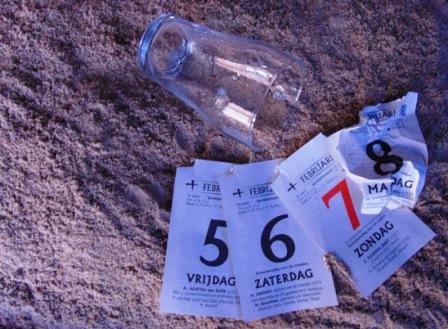You can live 30 to 40 days without food, but on average only three days without water. This also depends on condition (age, diarrhea...) and environmental factors (temperature...).

Pull on the skin of your hand, arm or stomach for three seconds and release. If the crease remains standing for a while, it is time to refuel. If your skin immediately looks normal again, everything is okay. The more elastic the skin, the better you are hydrated.
The cloud that you see in cold weather as you exhale, it is water (vapor). Just by breathing so you lose water 24-hour a day. Even if you do not see it. Of the exhaled air is 2.2% water. This is approximately 0.4 liters of water / day. And 500 ml through the skin ( 990 ml in urine and 100 ml stool ).
1 to 5% moisture loss cours you get thirsty, but also lack of appetite, and a red skin. And you will feel sleepy, impatient and sick.
At 6 to 10% you get headaches, difficulties to walk and you are dizzy. Formation of saliva stops, breathing becomes difficult and you speak unclear.
At a loss of 10 to 20% you become delirious and see worse. You cannot swallow. The skin wrinkles and is insensitive, you get muscle weakness and become unconscious.
A man can live six months without food, if he does not stop working. (François Cavanna)
Recommended amount of liquid per day
We should drink about 1.7 liter, also depending on the circumstances.
You lose up to two liters of fluid a day through sweating and breathing. When you exercise, you can even lose up to 2 liters in 40 minutes. This water loss should be compensated to stay (1.5 to 2l/day) healthy.
How long can you store water?
When it stays cool and dark, in a clean container: 3 days. You best fill the bottle complete, to the ultimate top before capping it.
Pure water can be stored almost indefinitely. Only there can resolve chemical substances, or by a biological contamination, it may be bad. However, water is almost never 100% pure. But as pure water as possible, e.g. in clean glass bottles, possibly with a little chlorine, will keep cool and dark very long.
Water intoxication can occur already by intake of three liters per hour.
Drinking too much water can be fatal. Such a death sometimes headlines in the news as: Students baptism, marathon runners, contest or wager.
Water intoxication is a result of taking too much water and not enough electrolytes.
Too much water penetrates through osmosis in to the cells, too much potassium disappears by diffusion out of the cells.
The salt grade in the blood falls, the cells adapt to by taking more and more water. They swell more and more. Swollen brain cells may close clamp blood vessels. This creates a lack of oxygen, unconsciousness and possibly death following cerebral edema.
